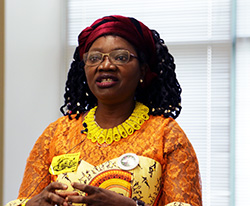The World Health Organization (WHO) reports that one in three women experience physical or sexual violence, most likely from an intimate partner. But a movement of churches and other groups around the world is committed to changing that troubling statistic.
Speaking at a lunchtime gathering at the Presbyterian Center in Louisville on October 18, Dr. Fulata Mbano-Moyo, an organizer of “Thursdays in Black: Towards a World without Rape and Violence,” encouraged United States Presbyterians to add their support to this growing movement. Moyo, who is programme executive for Women in Church and Society with the World Council of Churches (WCC), urged listeners to wear black on Thursdays as a sign of resistance to violence against women and girls.
Moyo’s talk was part of a meeting of the Presbyterian Church (U.S.A.)’s General Assembly Committee on Ecumenical and Interreligious Relations.
She said organizers of Thursdays in Black believe that “violence against women is the greatest human rights violation of our generation (attributed to Patrick Stewart).”
The World Health Organization defines sexual and gender-based violence as not only rape and attempted rape, but also sexual abuse and exploitation, forced marriage, domestic violence, trafficking, female genital mutilation, and other acts that result in physical, sexual, or psychological harm or suffering.
Such acts are rampant in war-torn areas where rape is often used as a weapon. But WCC groups working on the issue have discovered that “even in the most peaceful countries, women’s bodies are a battlefield,” Moyo said.
Moyo, who grew up in Malawi, told of being sexually abused herself at age nine. “I wouldn’t talk to anyone about it, not even my mother,” she said. “At that age you are so confused about who is to blame.” She even wondered if the experience was a normal occurrence—“something to be expected for girls.”
Last August, she was invited by the Nigerian Council of Churches to launch the Thursdays in Black campaign in Nigeria. In her speech to approximately 250 people at the launch event, she told the story of her abuse. Many women came up to her afterward to talk.
“I discovered that it was not just my story,” she said. “It was the story of so many women. It was important for me to be vulnerable so others could find their voice.”
Sexual and gender-based violence is “an area of Christian life that is not easy to talk about,” Moyo said, adding that Christians need to discuss these issues and take action to protect women and girls.
“There is abuse within the church by church people,” she said. “The conspiracy of silence around sexual abuse is what sustains it.”
The Thursdays in Black campaign was first launched during the WCC’s Ecumenical Decade of Churches in Solidarity with Women (1988–98), and relaunched in 2013 at the WCC’s 10th Assembly in South Korea.
It was inspired by similar movements around the world: In Argentina, the Mothers of the Plaza de Mayo was organized to protest the “disappearance” of children during the country’s military dictatorship (1976–1983). In Israel, Women in Black held vigils against war and violence. The Black Sash movement in South Africa was founded by white women to resist apartheid.
“The PC(USA) has paid attention to issues related to gender-based violence and sexual abuse for many years,” says Robina Winbush, director for ecumenical relations in the PC(USA)’s Office of the General Assembly. “This is an invitation to join the global ecumenical community in giving witness that God’s intention is for a world without rape and violence.”
Winbush suggested simple steps Presbyterians could take to support the Thursdays in Black movement: “Wear black on Thursdays, take a picture, post it on social media, and begin to tell the story to the world.”
Moyo said Thursdays in Black fits well with a current WCC initiative, “Pilgrimage of Justice and Peace.”
“We’re talking about a pilgrimage. This means we walk together.” Then she quoted an African saying: “If you want to go fast, go alone. If you want to go far, go together.”

